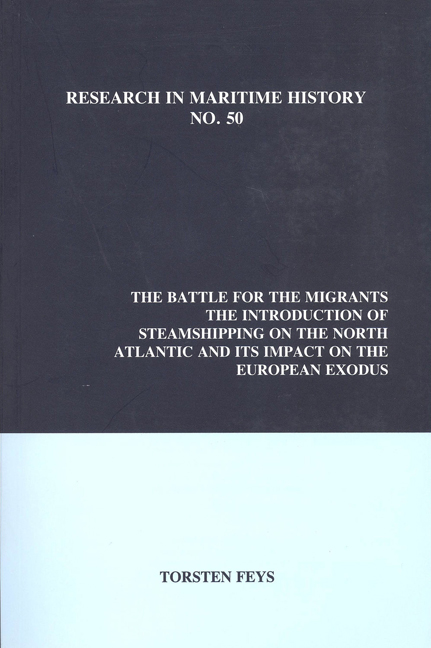 The Battle for the Migrants
The Battle for the Migrants Book contents
- Frontmatter
- Contents
- About the Author
- Acknowledgements
- Figures and Tables
- Introduction
- Part I State Policies and Their Influence on the Connections between Maritime and Migration Networks, 1830-1870
- Part II The Impact of Steam Shipping on Transatlantic Migration, 1870-1914
- Chapter 1 The Role of Middlemen
- Chapter 2 Competition and Collusion: The Growing Pains of Passenger Shipping Conferences
- Chapter 3 The IMM Merger and Further Consolidations in the Shipping Industry
- Chapter 4 The Nationalization of American Migration Policies and the Visible Hand of the Shipping Lobby
- Chapter 5 Shipping Companies' Interference with the Enactment and Implementation of Immigration Laws during the Progressive Era
- Conclusion
- Appendices
Chapter 4 - The Nationalization of American Migration Policies and the Visible Hand of the Shipping Lobby
from Part II - The Impact of Steam Shipping on Transatlantic Migration, 1870-1914
- Frontmatter
- Contents
- About the Author
- Acknowledgements
- Figures and Tables
- Introduction
- Part I State Policies and Their Influence on the Connections between Maritime and Migration Networks, 1830-1870
- Part II The Impact of Steam Shipping on Transatlantic Migration, 1870-1914
- Chapter 1 The Role of Middlemen
- Chapter 2 Competition and Collusion: The Growing Pains of Passenger Shipping Conferences
- Chapter 3 The IMM Merger and Further Consolidations in the Shipping Industry
- Chapter 4 The Nationalization of American Migration Policies and the Visible Hand of the Shipping Lobby
- Chapter 5 Shipping Companies' Interference with the Enactment and Implementation of Immigration Laws during the Progressive Era
- Conclusion
- Appendices
Summary
During the Civil War, the federal government intervened directly in immigration matters for the first time. Once the Supreme Court moved all migration issues from the state to the federal level in the mid-1870s, the pressures on Congress to legislate grew. A reluctance to do so because of concerns over trade agreements and international relations based on reciprocity eventually ebbed as both in Europe and the US the conviction grew that it was a nation's right to control migration to protect its citizens and institutions and to preserve its sovereignty. The question quickly moved from whether to exclude certain people to how and which ones. In this debate, which became known for its strange coalitions, two main pressure groups advocated restrictions. First, there were the labour unions which claimed that employers used immigrants as strikebreakers and to keep down wages. Second, new nativist movements, particularly in California and Massachusetts, claimed that the ethnic composition of the new migrant stream, which consisted mainly of eastern and southern Europeans and Chinese, threatened the “purity” of the “American race.” On the other side of the spectrum, various ethnic and religious communities defended liberal immigration policies that allowed co-ethnics and co-religionists to follow in their footsteps, while business groups were most often interested in increasing the size of the pool from which to recruit workers. A much neglected group in the debate were the shipping companies that earned the greatest part of their revenues from the transport of migrants. Aristide Zolberg and Maldwyn Jones acknowledged the importance of the shipping lobby in shaping American laws regulating migrant transport, but neither they nor any other scholar has paid much attention to their role in opposing immigration restrictions.
This chapter tries to shed more light on the position of the shipping lobby within the constellation of interest groups advocating liberal immigration policies. With the federalization of the issue and the growing reluctance of diplomats or other government officials to intervene on their behalf, shipping companies revised their strategies to focus more intently on Washington. The strategies will be discussed, while the role of shipping companies in shaping (and sometimes circumventing) immigration laws will be touched upon here and analyzed more thoroughly in the next chapter. The aim is to determine the lengths to which shipping companies went to ensure the right of entry of as many of their passengers as possible.
- Type
- Chapter
- Information
- The Battle for the MigrantsThe Introduction Of Steamshipping On The North Atlantic And Its Impact On The European Exodus, pp. 211 - 262Publisher: Liverpool University PressPrint publication year: 2012


